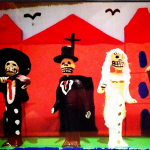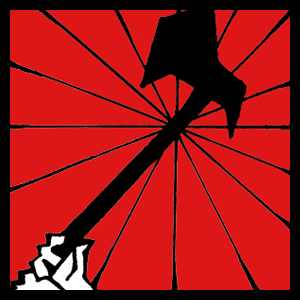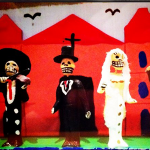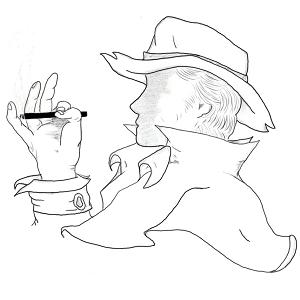FP164 – Coffin: Siren, Part 1 of 1
Welcome to Flash Pulp, episode one hundred and sixty-four.
![]()
Tonight we present, Coffin: Siren, Part 1 of 1.
[audio:http://traffic.libsyn.com/skinner/FlashPulp164.mp3]Download MP3
(RSS / iTunes)
This week’s episodes are brought to you by the Flash Pulp Facebook page.
It’s like a basement full of friends you didn’t know you had.
To join, click here.
Flash Pulp is an experiment in broadcasting fresh pulp stories in the modern age – three to ten minutes of fiction brought to you Monday, Wednesday and Friday evenings.
Tonight, Will Coffin, urban shaman, and his thirsty companion, Bunny Davis, find themselves locked in hand-to-hand combat with a civil servant.
Flash Pulp 164 – Coffin: Siren, Part 1 of 1
Written by J.R.D. Skinner
Art and Narration by Opopanax
and Audio produced by Jessica May
 The two-story suburban home’s upper windows had shattered under the heat of the blaze, but those on the lower floor remained closed, except a single pane in the front living-room, which had been cracked against the vigour of the air conditioner, and now allowed an outlet for the black smoke column that blew outwards as if tainted-steam from a roiling kettle.
The two-story suburban home’s upper windows had shattered under the heat of the blaze, but those on the lower floor remained closed, except a single pane in the front living-room, which had been cracked against the vigour of the air conditioner, and now allowed an outlet for the black smoke column that blew outwards as if tainted-steam from a roiling kettle.
At the center of the throng which had assembled to spectate the combustion, a steel-haired man held a weeping woman whose eyes peered constantly over his comforting shoulder, watching a lifetime of memories and knickknacks turned to kindling.
On the crowd’s furthest edge, however, Bunny Davis was engaged in a fist fight. Her whisky habit had her at a disadvantage as far as accuracy or balance were concerned, but, liquid bravery, and a fast moving mouth, had kept her upright thus far.
She took another swing at the firefighter, but, again, her punch slid along the clear Plexiglas-visor with little effect.
“Fargh,” said Will, only four-feet away, but entirely occupied with the stinging fury brought on by the can of mace he’d intercepted with his eyes.
“You ####ing pole-sliding truck-rider, just turn a-####in’-round and head back to your Ghostbusters shack.”
The woman behind the breathing mask responded with a strong right to the nose, which put Bunny over backwards, and brought the smell of copper to her nostrils.
Her impediments disposed of, the fire-woman strode towards the burning structure, laid a boot to the front door, then entered.
The onlookers cheered.
Bunny, finding her feet, rubbed at her aching gin-blossoms as she watched a man, unseen by the majority of the gathered, move to the left-most window on the second floor.
With the flames framing his silhouette, he rubbed at his sharp-cornered chin, then stretched his muscled shoulders with a languid roll.
As his white t-shirt ignited, he began to strum his guitar.
* * *
A week earlier, Coffin and his tipsy roommate had been loitering in front of the Eats’N’Treats, busied largely with ignoring the glaring sun and the uncomfortable bench.
Bunny had located an abandoned newspaper, and was filling the time remarking on random entries as she used the broadsheet as cover to move vodka from her pocket to her mouth, and back again.
“Holy ####,” she said, sipping, “looks like they’re playin’ the original Planet of the Apes downtown, I love that movie. Charlton Heston is the loudest ####ing actor I’ve ever seen. Sum##### lands on a planet full of monkeys and what’s he do? Yells at ‘em till they give him part of the Statue of Liberty – or, whatever, I mean, it’s been a while – but what then? Yells at ‘em some more.”
“That’s not quite how the film goes,” replied Will.
“Whatever, all I’m sayin’ is the man was a god #### genius.”
Coffin’s attention, only marginally involved in the conversation, was on a white truck sitting idle between a pair of the lot’s faded yellow lines. The vehicle had parked five minutes earlier, but a passenger had yet to emerge.
“No one shouts like Heston anymore,” Bunny continued. ”I blame Clint Eastwood.”
The pickup’s door swung open, and a squat woman stepped down from the running-board. It was tough to tell her age, as she wore large black sunglasses which reminded Will of the visors occasionally worn by the blind, and the thick plastic left nothing but her furrowed cheeks as a clue. He guessed sixty.
“I’m looking for a Mr. Will Coffin,” she said.
“I’ve heard of him,” replied Bunny. “Lazy #######, that one.”
“Sorry,” said Will, “pay no mind to my, uh, assistant; too much sun, and too much cheap raspberry vodka, and she gets a little talkative. Something I can be of help with?”
“Name’s Euphemia Dumfries. I’m a fire chaser out of the station at main and baseline. A paramedic friend of mine said I should talk to you – I, uh, a month ago we were responding to a basement fire and I heard this song. Simple thing, just an acoustic guitar and a strong voice – but it came floating over the heat, like a melody made of smoke. I’m hearing this tune over the crackle and pop, and I see this guy on the second floor. I lost it a bit, and pushed further inside than I should have. I caught myself just before running into the living room, where the floor was gone entirely. Scary thing about basement fires, you get down below ground-level with no stairs and you’re basically standing in a barbecue pit. Anyhow, I was fine, but I was sure the fella was a goner – thing is, even once things were cleared, we didn’t find anyone.”
She paused in her story, and Will stood, offering her his spot on the bench.
Shaking her head, she pushed out a breath and then continued.
“I’m old for the work – if I didn’t come so cheap and have the strength of an Alabama chain gang, I’d’ve been off the truck a long time ago. I didn’t want to put in for a talk with a doc, as I figured they’d use it as the last straw. A couple weeks later though, we were dousing a garage over on Melville, and it hit a propane tank the home owner had forgotten under a pile of newspapers he’d intended on recycling. Brilliant. Blew out the drywall and his kitchen went up like a match. Now, I’m way back at the truck at this point – and I hear it again. There was the same guy, thirty-ish, and pretty like a TV doctor. He was at the second floor window again, and he was singing – he was singing to me. I don’t really know what happened. I kicked through the front door, which was relatively unscathed, and bolted upstairs. I stomped into a guest bedroom, and there he was. He smiled, then he said ‘44 Wiltshire.’ That’s on the east end of town. What I didn’t know was that things were pretty much under control on the ground floor. As soon as the danger was gone – so was he. I got my ### chewed out something fierce for acting like such an idiot with nothing to show for it.”
“Not your fault, really,” said Coffin, “I’ve heard of your troubadour. Died a decade and a half ago while writing a song for his wife in their bedroom. Story goes that the place burned down while she was off wrestling with his best friend. Now he serenades bystanders, and apparently first responders, from the interior of burning homes, hoping they’ll join him inside.”
“Why does he do it?” asked Euphemia, “and is there a way to stop it?”
“Well, spite, partially, but I figure he’s probably hoping one will go willingly. He’s claimed a few lives, but I doubt they were inclined to hang around with him in the afterlife, so his desire – for companionship – goes unsatisfied.”
“Was a good looking eternity, to me.” she replied. She adjusted her glasses and cleared her throat. “Honestly, I guess I knew the answer all along. I live to help, and, truth is, I’m getting old. If I don’t die in my boots shortly, I’ll end up accidentally doing so alone in my own bed.”
They’d argued the point for seven days.
Flash Pulp is presented by http://skinner.fm, and is released under the Canadian Creative Commons Attribution-Noncommercial 2.5 License.
Text and audio commentaries can be sent to skinner@skinner.fm, or the voicemail line at (206) 338-2792 – but be aware that it may appear in the FlashCast.
– and thanks to you, for reading. If you enjoyed the story, tell your friends.
Coffin’s theme is Quinn’s Song: A New Man, by Kevin MacLeod of incompetech.com
 We were shooting down the road like a greased eel amongst the groping hands of country-fair attendees, when we spotted a goliath by the roadside.
We were shooting down the road like a greased eel amongst the groping hands of country-fair attendees, when we spotted a goliath by the roadside. Coffin was sitting in Dorset’s, watching his soggy roommate, Bunny, finish off yet another foamy glass of Corona. It had been her fifth beer.
Coffin was sitting in Dorset’s, watching his soggy roommate, Bunny, finish off yet another foamy glass of Corona. It had been her fifth beer. A month earlier, he himself had been a passenger in The Lily Belle’s hold.
A month earlier, he himself had been a passenger in The Lily Belle’s hold. I’ll admit it – Johanna was the closest to a post-apocalyptic friend that I’d had up until that point. Not that we talked much, I suppose, but she’d quickly took up a hose when it looked like my house was likely to burn down, and that sort of thing tends to make me like a person.
I’ll admit it – Johanna was the closest to a post-apocalyptic friend that I’d had up until that point. Not that we talked much, I suppose, but she’d quickly took up a hose when it looked like my house was likely to burn down, and that sort of thing tends to make me like a person.